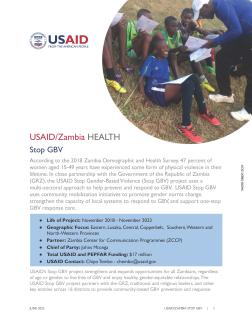According to the 2018 Zambia Demographic and Health Survey, 47 percent of women aged 15-49 years have experienced some form of physical violence in their lifetime. In close partnership with the Government of the Republic of Zambia (GRZ), the USAID Stop Gender-Based Violence (Stop GBV) project uses a multi-sectoral approach to help prevent and respond to GBV. USAID Stop GBV uses community mobilization initiatives to promote gender norms change, strengthen the capacity of local systems to respond to GBV, and support one-stop GBV response care.
USAID’s Stop GBV project strengthens and expands opportunities for all Zambians, regardless of age or gender, to live free of GBV and enjoy healthy, gender-equitable relationships. The USAID Stop GBV project partners with the GRZ, traditional and religious leaders, and other key entities across 16 districts to provide community-based GBV prevention and response services. The project also provides support to eleven One Stop Centers (OCS) established under the prior project in order to standardize quality of care and support provided to GBV survivors.
|
OSCs attend to the physical well-being of GBV survivors and address their psychological and emotional needs in a holistic way. Services provided by OSCs include medical examinations, access to post-exposure HIV prophylaxis, the provision of emergency contraceptives, psychosocial counseling, legal advice, police support, and referrals for resources such as lodging at safe houses for survivors unable to immediately return to their homes.
USAID Stop GBV also provides:
- Psychosocial counseling training in traditional and faith-based settings to prevent sexual violence;
- Provision of livelihood opportunities for GBV survivors;
- Coordination of GBV stakeholders at national and district level to improve the policy and legal framework for GBV prevention;
- Enhanced communication platforms to advocate for positive gender norms;
- Technical assistance to the GRZ in support of 28 OSCs;
- Improved legal support within the criminal justice system for GBV survivors; and,
- Enhanced structural systems to promote protection of children from abuse.
In select districts, USAID Stop GBV implements core activities of the Determined, Resilient, Empowered, AIDS-Free, Mentored, Safe (DREAMS) Initiative. Initiated under the U.S. President’s Emergency Plan for AIDS Relief (PEPFAR), DREAMS is designed to prevent new HIV infections among adolescent girls and young women (AGYW) ages 10-24. Within the DREAMS framework, USAID Stop GBV works with 5 other implementing partners across 8 districts and 40 health facility catchment zones to provide AGYW with safe, confidential spaces to access a package of services tailored to their individual needs. Additionally, the project engages sexual partners of AGYW, parents, schools, and communities to strengthen the supportive networks necessary for young women to thrive.
The Stop GBV project also conducts community-based mobilization for gender norms change, training for DREAMS staff members to identify and respond to GBV, and facilitates referrals to and from One Stop Centers for post-violence support. For adolescent boys and young men aged 9-14 years old, the project implements the “Coaching Boys into Men” activity which trains and motivates high school coaches to teach their young male athletes healthy relationship skills and that violence never equals strength.
Expected Results
Grounded in the notion that girls and women have the power to make decisions about their own health and that boys and men are crucial in promoting gender-equitable relationships, the Stop GBV project seeks to reduce the incidence of GBV, child marriage, and teenage pregnancies. The project will increase timely access to and delivery of quality GBV and HIV services through One Stop Centers for those most vulnerable and in need.

